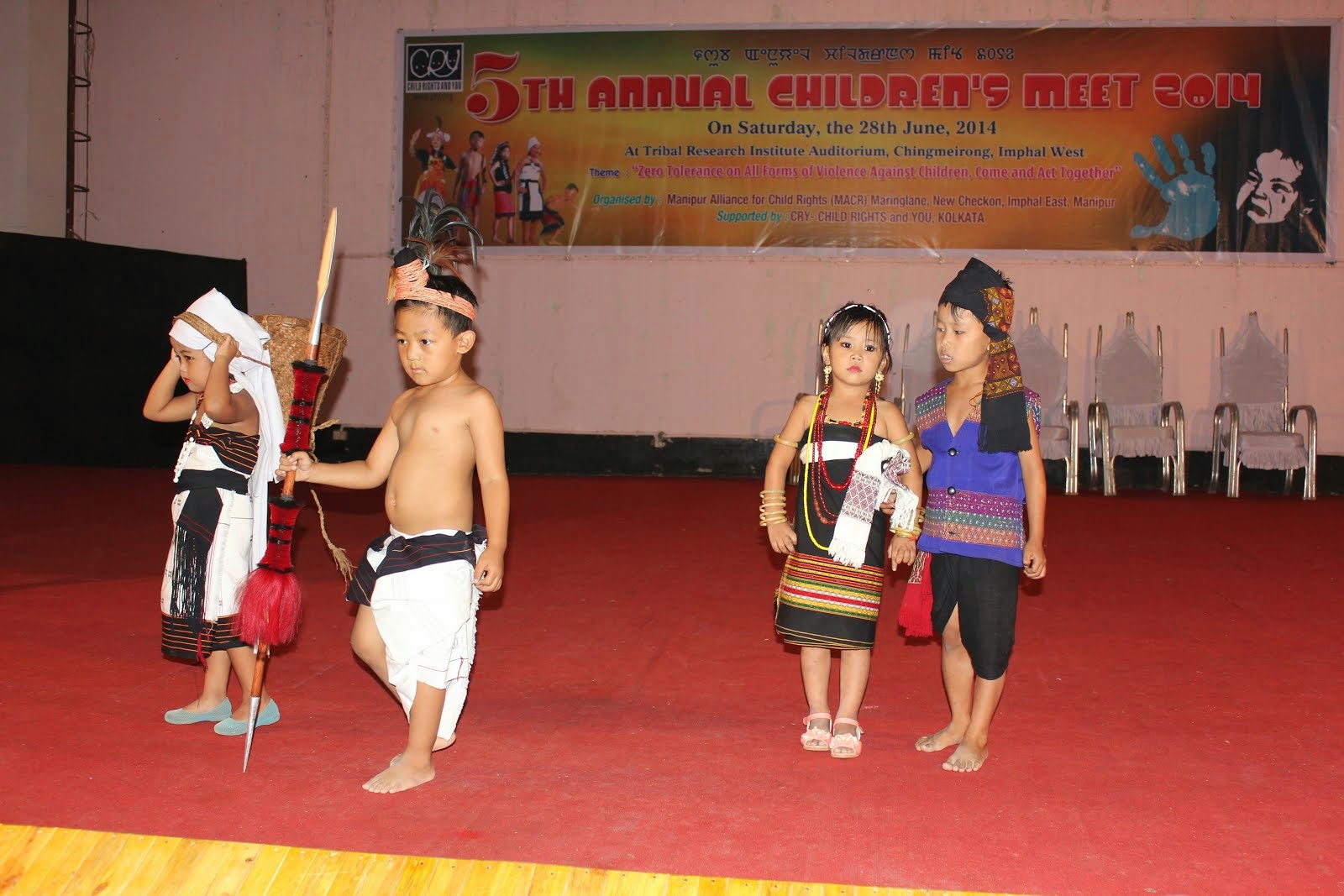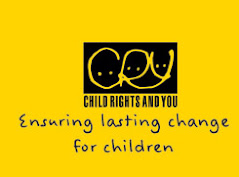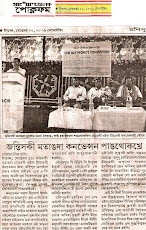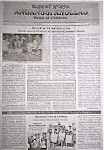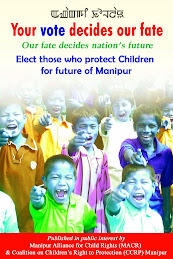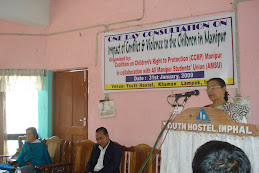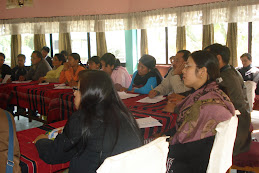
Saturday, April 25, 2009
Monday, April 20, 2009
Bodies up in arms against Loktak Operation
Bodies up in arms against Loktak Operation
Source: The Sangai Express
Imphal, April 20 2009: Even as displaced students staged a Wakat Meepham demanding the ongoing Operation Summer Storm of the Army at Keibul Lamjao National Park of Loktak lake be stopped and allowed them to go to school and attend normal classes, students bodies like All Manipur Students' Union (AMSU) and Democratic Students' Alliance of Manipur (DESAM) as well as child rights bodies like Manipur Alliance for Child Rights (MACR) and Coalition on Children's Right to Protection (CCRP) have contended that the ongoing operation is in violation of the fundamental rights of the children of surrounding areas.Demanding the ongoing Operation Summer Storm be stopped and allowed them to study in peace, a large number of displaced students today staged a Wakat Meepham at Ithai Pouoibi Community Hall today.Students from schools in Ithai area also participated in the protest demonstration expressing solidarity to the cause of their displaced counterparts. Over students participated in the demonstration putting up placards inscribed with slogans like 'Stop Operation Summer Storm', 'Allow us to go to school and study peacefully', 'Students are the future pillars of the society', etc.Meanwhile, maintaining that the ongoing Army operation at Loktak lake has deprived education of many children in the surrounding villages, All Manipur Students' Union (AMSU) and Democratic Students' Alliance of Manipur (DESAM) have appealed to suspend the operation at once.Addressing a press conference jointly at the head office of AMSU here today, the leaders of the two student bodies have also called upon the State Government for taking up necessary measures in this regard.HRD secretary of AMSU Dipaljit Ningthoujam asserted that ongoing Army operation is in violation of the Common Article-III of the Geneva Convention and the guidelines to be observed during non-conventional war have not been respected.Apart from displacing many villagers and using innocent civilian as human shields by the Army, the ongoing operation has deprived the children of their rights to education, Dipaljit said, adding that a serious threat has also been posed ion the habitat of the rare and endangered species of Sangai at Keibul Lamjao National Park.Education secretary of DESAM A Thoithoi pointed out that the ongoing operation is against the public demand for making education a free zone.He also decried the Education Minister of the State Government for not coming out with any statement from his side inspite of the fact that the students of the surrounding villages have not attended their schools for more than one week now.This shows that he is not fit to be the Education Minister, Thoithoi added.On the other hand, two child rights bodies, namely Coalition on Children's Right to Protection (CCRP), Manipur and Manipur Alliance for Child Rights (MACR) have contended that the ongoing operation has violated the fundamental rights of the children of the surrounding villages like Ithai, Khordak, Arong Nongmaikhong and Laphupat Tera.In a joint statement, CCRP convenor S Sharaju Devi informed that members of the Fact Finding team of Manipur Alliance for Child Rights (MACR) and Coalition on Children's Right to Protection (CCRP) visited these areas yesterday and found that besides the 3000 displaced villagers, there are as many as 1300 school going children reading in 6 different schools who could not attend their schools due to the impact of the ongoing operation.Listing the names of the schools that have been forced to close due to the ongoing operation as Nongmaikhong Junior High School, Emanuel Grace Academy, Nongmaikhong Government LP School, Nongmaikhong Girls' Primary School (Aided), Eden Garden English School, Laphupat Tera Khunou LP School, the CCRP convenor lamented that one Balika UJB School situated at Sekmaijin and having more than 100 students is being occupied by the security forces since March 28 .Urging the security personnel to vacate the school and restore normal classes at the earliest, the convenor of the child rights body observed that prolonged closure of educational institutions on the eve of their term end exams is a vivid example of violation of the fundamental rights to education of children as enshrined in Indian Constitution as well as the United Nation's Convention of Rights of the Child (CRC) .Besides unprecedented large deployment of armed personnel, indiscriminate firing of heavy artilleries, constant aerial surveillance and intrusion of Army into the civilian areas drastically traumatised the children both psychologically and physically, the child rights body asserted.It also noted that there is high possibility of epidemic outbreak such as cholera, diarrhoea, dysentery, typhoid among the displaced children as the relief camps are highly congested with poor sanitary condition.During the visit of the Fact Finding Team many children were found lying on the floor with signs of weak health.So urgent action from the authorities concerned is highly needed.It will definitely impact long term psychological drawbacks to the young children.Appealing to call off the ongoing Operation Summer Storm with immediate effect, the two child rights bodies have also demanded restore of peace and normalcy in the surrounding villages so that the children could go to their a schools without any fear again.Meanwhile, Young Ideal Club cum Library, Social Educational Sports and Cultural Organisation, Young Guidance Club, Keibul Lamjao Women's Development Association, Keibul Lamjao Women's Development Welfare Association, Keibul Chingmei Development Organisation and Momnu Irikhombi Lup (Mikhol Keibul Branch) have announced their decision of launching various agitations in association with the people if the ongoing Army operation at Loktak Lake is not called off at once.
Children worst affected by Loktak operation: rights groups
Source- IMPHAL FREE PRESS
Children worst affected by Loktak operation: rights groups
7 hours, 41 minutes, 33 seconds ago
IMPHAL, Apr 20: The ongoing Operation Summer Storm being carried out by the security forces in the Loktak lake area including Keibul Lamjao National Park area grossly violates the fundamental rights of the children of the surrounding villages such as the Ithai, Khordak, Arong Nongmaikhong and Laphupat Tera.The was stated by a fact finding team of the Manipur Alliance for Child Rights, MACR, and Coalition on Children’s Right to Protection, CCRP, who visited the area on April 19 and found that besides the 3000 displaced villagers, there were as many as 1300 school going children studying in six different schools which were closed due to the operation.The schools which have been closed because of the operation are Nongmaikhong Junior High School, Emanual Grace Academy Nongmaikhong, Nongmaikhong Govt LP School, Nongmaikhong Girls Primary School, Eden Garden English School, Laphupat Tera Khunou LP School.Further, the Balika UJB School situated at Sekmaijin having more than 100 students has been occupied by the security forces since March 28, the report from the team said.The two bodies have made an appeal for the immediate calling off of the operation as the prolonged closure of the schools on the eve of the term exams was in gross violation of the fundamental rights of the right to education of the children.The heavy deployment of the security forces and firing of heavy artillery etc. had traumatised the children who were also open to threat from epidemics at the relief camps which are highly congested with poor sanitary conditions, it said while stating that many children were found lying on the floor at the relief camps with signs of weak health.
Press Release by MACR and CCRP for protection of Child Rights during army operation " Operation Summer Storm"
The ongoing “Operation Summer Storm” being carried out by Indian Security Forces in Loktak lake including Keibul Lamjao National Park areas grossly violated the fundamental rights of the children of the surrounding villages such as Ithai, Khordak, Arong Nongmaikhong and Laphupat Tera. The members of Fact Finding team of Manipur Alliance for Child Rights (MACR) and Coalition on Children’s Right to Protection (CCRP) who visited the areas on 19th April, 2009 found that besides the 3000 displaced villagers, there were as many as 1300 schools going children reading in 6 (six) different schools who could not attend their schools due to the impact of the ongoing operation. The name of the schools being closed due to the “Operation Summer Storm” are Nongmaikhong Jr. High School, Emanual Grace Academy Nongmaikhong, Nongmaikhong Govt. L.P. School, Nongmaikhong Girls Primary School (aided), Eden Garden English School, Laphupat Tera Khunou L.P. School. It may be worth to mention here that, one Balika UJB School situated at Sekmaijin having more then 100 students has been occupying by security forces since 28th March, 2009 till date. We demand to vacate the school immediately which has been occupied by the security forces to restore the normal class at the earliest.
The prolonged closure of educational institutions on the eve of their term end exams is a vivid example of violation of the Fundamental Right to Education of children as enshrined in Indian Constitution as well as United Nation’s Convention of Rights of the Child (CRC). Besides unprecedented large deployment of armed personnel, indiscriminate firing of heavy artilleries, constant aerial surveillance, and intrusion of army into the civilian areas drastically traumatized the children both psychologically and physically. There is high possibility of epidemic outbreak such as cholera, diarrhoea, dysentry, typhoid as the relief camps are highly congested with poor sanitary conditions. Many children are found lying on the floor with signs of weak health. Urgent action from the concerned authorities is highly needed. It will definitely impact long term psychological drawbacks to the young children. Hence the two child rights bodies hereby appeal to call off the ongoing “Operation Summer Storm” with immediate effect. We demand to restore peace and normalcy of the surrounding villages so that children could go to their schools without fear again.
We appeal to Stop Operation Summer Storm immediately
We condemn using human seals and forced labour
Restore Peace and start Educational Institutions working
Save both lives of Humans and Sangais
S. Sharaju Devi
Convener,
CCRP Manipur
Thursday, April 16, 2009
Silence of the Lambs
Wednesday, April 15, 2009
CRY asks voters to vote for children’s rights this elections
By Satya Gopal Dey
Stand up for what is right
Press Release
This Elections, Vote For Children!
CRY asks voters to vote for children’s rights this Elections
New Delhi, April 13, 2009: With the nation going to vote in three days, CRY (Child Rights and You) has directly communicated with all political parties across the country a list of issues that parties need to keep top of mind. The Child Rights Manifesto (below) lists the issues that are affecting children’s lives in India, but are conspicuously absent from the pre-election agenda of political parties.
“Like in the last Lok Sabha Elections in 2004, we have been watching the political arena closely to see if children’s issues are reflected in the agenda of candidates,” said education activist and CRY Director Ila Hukku. “We find that despite the large number of children’s organizations pointing out this noticeable gap, political parties continue to ignore the children of India and their issues. So we are now going directly to the parties, knocking on doors to remind candidates that the ultimate winners should be children.” CRY representatives will also be speaking to candidates directly in face to face meetings
“As the nation goes to vote, we are reminding voters that one fourth of the country – as many as 400 million citizens – will not vote because they are children. As voters and candidates, we are charged with the responsibility to see to it that their interests do not slip off the political radar,” said Dipankar Mazumdar, Director, Youth & Development Support.
Without the right to choose their political leaders, children cannot directly ensure that
- 70 of every 1000 children born do not die each year
- Every 2nd child under 5 is not malnourished
- All children are in school and complete formal schooling :
- the 52% children who are out of school are enrolled and ensured complete formal schooling
- All children have access to adequate nutrition and equal opportunities
- Children are protected from child labour, abuse and trafficking
But as a Voter, YOU can!
Child rights can only become central to a country’s political agenda if its people choose to make it priority by ensuring government accountability to actualize the rights of children. Children must be looked on as equal citizens, entitled to equal rights. So when you vote this time, voice the rights of children - think of children, think of the promises we made to them in our Constitution to live a life of dignity that must include food, health, shelter, education, protection and play.
This election, CRY - Child Rights and You, seeks to raise public awareness on the state of children in India and unite people to stand up and demand what is right.
We call out to each and every one of YOU – India’s electorate - to hold representatives, contesting candidates, political parties and policy makers accountable for child rights by demanding specific non-negotiables from the government. Working with India’s children for the past 30 years, we know that we will bring in the day when all children are ensured their right to the childhood they deserve. And with your voice, we firmly believe we will.
Child Rights Charter
- The definition of a child to be universally applicable to all persons under the age of 18 years, thereby amending discrepancies in policies and acts affecting children.
Increase government expenditure on children. Specifically increase expenditure on education to 10% and health to 7% of GDP. - The government should ensure that all children age 6-18 years, without discrimination, should be in government formal, full-time schools that provide quality education in their own villages/hamlets/in the neighbourhood. . All children below 6 years should be in anganwadis
- The RTE Bill (Right of Children to Free and Compulsory Education Bill, 2008) should be redrafted to reflect the true sprit of children’s right to education. Privatization and commercialization of education to be discouraged.
- Immediate provision of nutritious mid-day meals in all primary schools and extension of this scheme to include all children including out-of-school children right through the year.
- Make available Integrated Child Development Services to all children under the age of six years, as per the Supreme Court order of November 2001.
- Complete prohibition on all forms of child labour across sectors including agriculture. All working children and child labourers to be brought into the formal school system with special emphasis on girl children who are engaged in household work and child-care.
- Revision of the National Policy for Children (1974) to make it more comprehensive and in line with the Constitution and the United Nations Convention on the Rights of the Child.
- Formulate and implement a comprehensive rights-based policy on food security for all with extensive legal safeguards, in order that no child goes to bed hungry and no child is born underweight and stay undernourished. The criteria for defining the poverty line and therefore coverage under the Public Distribution System (PDS) for food should be revised. Universalize the PDS to cover all families.
- Enactment and implementation of effective legislation for preventing and prohibiting sexual abuse of children and trafficking of children
- Education to be inclusive so that children with disabilities are also ensured equal opportunities to be integrated into mainstream society
- For children living in conflict-affected areas, ensure children’s fundamental rights, including the right to protection, to education and to live with their family.
The demands above can be effectively realised only when larger issues, closely linked to children’s rights, are ensured. Some of these are:
- Migration and displacement lead to disruption in children’s development, access to education and health facilities making them vulnerable to exploitation and abuse. To prevent this it is critical to
- Prevent lop sided development that induces displacement of the marginalized communities.
- Alter Special Economic Zone Act 2005, preventing misappropriation of land, ensuring that the marginalized are not exploited. Put in place and implement an effective rehabilitation and resettlement policy
- Reformulate the Jawaharlal Nehru National Urban Renewal Mission (JNNURM) where the government shoulders its responsibility, rather than promoting Public-Private partnerships, in order to effectively uphold the housing rights of urban poor
- Implement land reform policies that will prevent migration and enable children to develop within their communities and geography.
- Withdraw the Coastal Management Zone (CMZ) Notification 2006 and Implement Coastal Regulation Zone (CRZ) 1991 as an Act so as to protect natural resources and the customary rights of coastal communities.
- Implement Forest Dwellers (Recognition of Forest Rights) Act 2006 which allows tribal communities greater control over forest resources.
- Repeal Petroleum, Chemical and Petrochemical Investment Region (PCPIR) Act 2003 which commodifies common property resources.
- Ensure living and equal wages for all adults to enable them to protect their children’s rights.
- Revision of the agriculture policy to protect small and marginal farmers
- Social security for all including unorganized workers be guaranteed and implemented to safeguard their rights.
- Ensure the right to housing for families so that every child has the right to safe space.
- Ensure that communalism be countered in order to prevent atrocities against minorities and ensure the basic rights for all. Establish secular practices in society and polity.
- Ensure that basic human rights are protected during counter-terrorism operations. The Indian government to stop supporting war efforts both within and outside its boundaries.
About CRY (Child Rights and You):
CRY – Child Rights and You earlier known as Child Relief and You – is India’s leading advocate for child rights. Over 30 years CRY has partnered with NGOs, communities, government, the media and is dedicated to mobilising all sections of society to eliminate the root causes of deprivation, exclusion, exploitation and abuse. For more information please visit us at www.cry.org
Tuesday, April 14, 2009
Sunday, April 12, 2009
Election Advocacy Starts
Election advocacy campaign starts
By Our Staff Reporter- Sanghai Express
IMPHAL, Apr 12: Manipur Alliance for Child Rights, Coalition of Children Rights and Protection and Sustainable Development Centre jointly kicked off an election advocacy campaign on child rights in Bishnupur district today. The campaign which will continue till April 14 mainly stressed on withdrawal of AFSPA, full implementation of Juvenile Justice Care and Protection Act, facilitation of education and food related benefits to children, taking up of schemes related to children by political parties and not to house security personnel in school buildings. The programme carried out through street corner and poster campaigns was conducted at Kumbi, Kwakta, Moirang, Ningthoukhong, Nambol and Keinou today.
Brief News
Election advocacy
2009-04-13 07:28:16
Hueiyen News Service
Imphal, April 12: Sustainable Development Centre Network, Thamnapokpi, Manipur Alliance for Child Right and Coalition on Children Right to Protection as a part of its three-day campaign on child right, in relation to the upcoming Lok Sabha Election 2009 had organized street corner meetings and poster campaigns at various places of Bishnupur District including Kwakta, Kumbi and Nambol today. In the first day of the campaign today, booklets printed with the charter of demands for child right had been distributed to the general public at free of cost.
Monday, April 6, 2009
Sunday, April 5, 2009
Candidates urged to protect child rights
Imphal, April 05: The Manipur Alliance for Child Welfare today pressed all the political parties and candidates in the fray to include promises to take up steps to relief the problems facing by the children in Manipur in their election manifestos.Speaking at a press conference, convener of the body, Montu Ahanthem said in the state, children who are consider to be future pillars of the society are facing various problems. Many children have been victims of AFSPA, arm violence and HID/AIDS.The issues related with the children who become orphans owing to HIV/AIDS are becoming victims of child labour and trafficking. This could not keep aside. So, politicians should promise to take up works for wipe out such evils from the society, Montu said appealing the electors to vote to those who could address the issue well.He further observed that elections are the only way to bring a government which can address the public grievances and bring a great change. So, people should elect those persons who could work sincerely for the welfare of the people.If people voted to those candidates who can afford money, this would amount to diversion of the people representatives from taking up people’s welfare programmes, he said. Convener of the Coalition on Children Rights Protection, S Surju observed that it will be wrong to neglect children assuming that they are not enjoying the rights to franchise.Children should be avail free education till Standard-V and check child labour and child trafficking. ART treatment should be made to the children living with HIV/AIDS free of cost, she said.
MACR, CCRP decry
Source- Sanghai Express
Brief News
By Staff Reporter
IMPHAL, Apr 5 : Observing that political parties have been overlooking various issues confronting children, not yet eligible to vote and that none of their issues are reflected in the election manifestoes of any political party, the Manipur Alliance for Child Rights (MACR) and the Coalition on Children Right to Protection (CCRP) have sought attention of all political parties in this regard.Speaking to media persons at Manipur Press Club here this afternoon, functionaries of MACR and CCRP decried MP Dr Meinya reported statement in the Parliament that there was no child labour in Manipur. They also denounced the failure of the MP to raise any of the issue related to children in the parliament. They also launched two posters inscribed with the words “Your vote decides our fate” in both English and Manipuri. Lamenting over political parties sidelining and leaving out issues related to children from their election manifestoes for they are yet to enjoy their voting rights, CCRP convenor S Sarju appealed to political parties to take up the issue of child care and protection on priority basis and to feature it in their election manifestoes.Asserting that the Indian Parliament too is little concerned about the various issues confronting children, they called upon the people to elect MPs who can raise the issues of children of the State in the Parliament. MACR convenor Ahanthem Montu also appealed to the people not to elect candidates who did not address the issues of children in Manipur. Strangely, several issues confronting Manipur disappeared before the elections, he asserted. The two bodies also put up a 13 point demand including treatment of education as an essential service and exemption of education sector from bandhs and blockades. Another point of their demand is establishment of the State Commission for Children.
Child rights bodies want children’s issues taken up in polls
IMPHAL, April 5: As the 15th Lok Sabha election draws nearer the children of Manipur today appealed to the people to choose the right person who will think about the children who are considered the future pillars of the nation. “Your vote will decide our fate and our fate decides the nation’s future. Elect those who protect children for the future of Manipur,” stated a poster which was also released today.The release of the poster was held at the Manipur Press Club in Imphal. The poster was published by the Manipur Alliance for Child Rights (MACR) and Coalition on Children’s Right to Protection (CCRP).Deeply concerned about children, MACR convenor Montu Ahanthem expressed to the media that with the election coming nearer, political parties were coming out from their hibernation and getting into full swing to woo the voters. Manipur will poll on the 16th and 22nd of April for electing two MPs and invariably the conflict torn state will once again be caught up in election fever. However, so far no election issues can shift the voters minds from long standing issues of the society like AFSPA, insurgency, lawlessness, etc. Children have no voting rights and many a time their voices are not heard as election manifestos give least importance to their issues. Election, being the only available democratic medium in which people’s mandate is counted for bringing a sea change in the entire governance every voter must use the utmost wisdom while casting his or her vote, he said.It is high time that the concerned civil society bodies strictly impose public code of conduct for elections that should be observed by all the political parties, candidates as well as the voters. So, let us give our mandate for ensuring a just society in which children’s rights are fully protected and ensured and let us strive together so that children’s issues are placed among the top agendas in every election thereby making it the agenda in every election and making it the major deciding factor for all the voters, for they are our future, he said while adding that it will then truly be the beginning of a total democratic revolution for a just society.CCRP convenor S Sarju also maintained that children in Manipur are the victims of AFSPA, armed violence, drugs, HIV/AIDS epidemic, etc. While the frequent curfews being imposed plus the failure of the government in providing essential services like power, water and basic health services, not to mention the price hike of the essential commodities have resulted in the gross deprivation of the rights to life, education and other fundamental rights of children.And one should not equate property, money and manipulation capability as plus factors for candidature.
Voices of Children of Manipur on 15th Lok Sabha Election 2009
In the prevailing situation in Manipur, elections either of the Lok Sabha or Vidhan Sabha, a rational and decisive mandate of the voters envisaging accountable and transparent governance is crucially needed. The voters need to decide the right candidate to be elected considering the future of the children and must mount pressure on the political parties and the candidates for ensuring their concern and commitment upon children. Since issue of child rights violation is a political issue, it can be resolved only through a strong political intervention. If voters allow themselves to be fooled and purchased by money power of the politicians they not only sell out their voting rights but also ruin their future as well as the future of their children. Therefore we must stop the most unwise and unethical practice i.e. commoditization of the voting rights in elections at any cost; else the great blunder committed by today’s adults will never be forgiven by their children in future.
In the present electoral scenario which is largely overpowered by muscle and money diluting the very spirit and principles of democracy, a collective peoples’ upsurge for a free and fair election is called for. We believe an election through universal adult franchise is the backbone for a parliamentary form of democracy. Voting is not only a fundamental right for a bona fide citizen but also the primary responsibility for every sensible citizen. Politics based on a strong party ideology and policies, accountability and backed by leaders having a clean image with inspiring personality and character must be encouraged. One should not equate property, money and manipulation capability as plus factors for candidature. Voters’ wisdom and principle should be upheld and never be swayed by corruption and threats. Only then an enabling electoral environment can be created where public debate, open interaction and dialogue decide electoral fortune of the candidates through free and fair polls.







